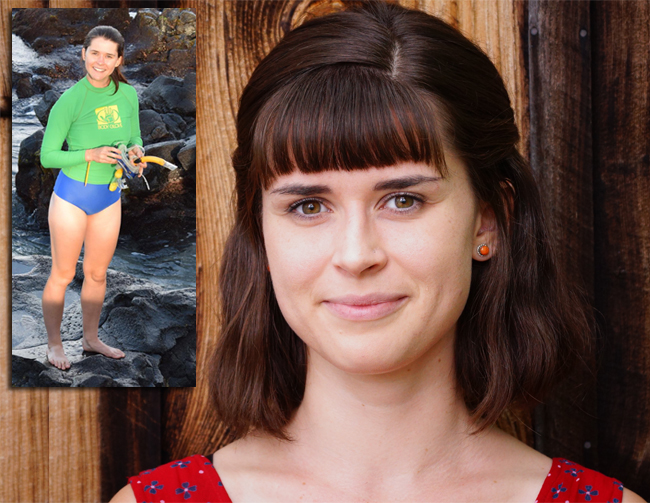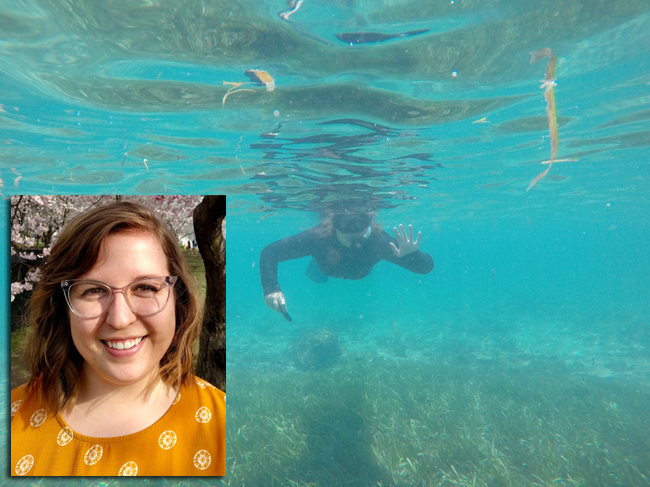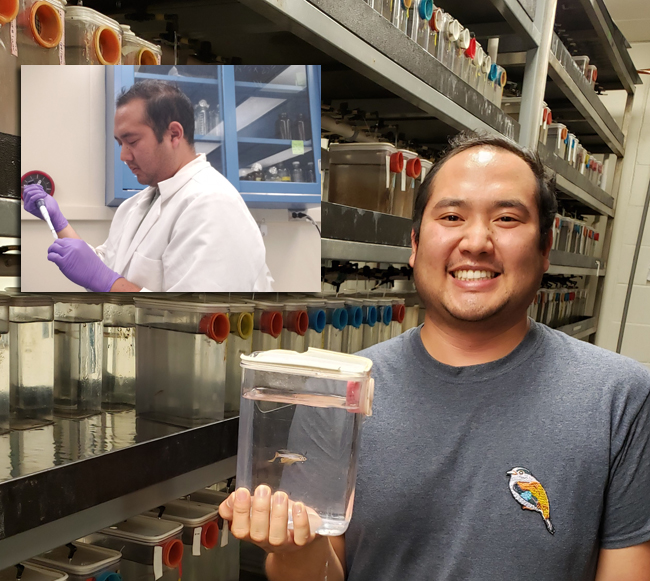Awardees are graduate students at Stony Brook University, Cornell University and Brooklyn College
— By Chris Gonzales, Freelance Science Writer, New York Sea Grant
New York, NY, September 16, 2019 – New York Sea Grant is proud to announce three finalists in the 41st class of Sea Grant’s John A. Knauss Marine Policy Fellowship. Starting early next year, Celina Scott-Buechler, Naomi Lewandowski, and Irvin Huang are among the fellowship program’s 69 national finalists.
This fall, Celina, Naomi and Irvin will travel to Washington, D.C., joining the other 2020 finalists from across the nation to interview with offices that work on or have interest in coastal and marine science and policy issues. Celina is on the legislative track and Naomi and Irvin on the executive path, meaning the later are both slated to work in non-legislative offices in Washington, D.C. Following placement, which will take place between late October and late November, each will begin their fellowship in February 2020.
“Congratulations, Celine, Irvin, and Naomi! And welcome to the Sea Grant family as Knauss Fellowship finalists,” says New York Sea Grant Director Becky Shuford. “The Knauss Fellowship is a highly competitive program and I could not be more proud and excited for our program’s newest Fellows. Each hails from a different New York-based university, and will be bringing their skills and knowledge to bear on important marine and coastal policy and conservation initiatives. The Fellowship in turn will help to expand their experiences at the science-policy nexus, and along with the rest of the 2020 Knauss class set them up for future success.”
Finalists for Knauss fellowships are selected through a competitive process. Students finishing master's, juris doctor, and doctor of philosophy programs with a focus in marine science, policy, and management apply to one of 34 state Sea Grant programs. Applicants who are successful at the state level advance and their applications are reviewed by a national panel. Further details about the national cohort can be found via the National Sea Grant College Program (NSGCP)'s website, www.seagrant.noaa.gov/Knauss.
NYSG spoke with the three New York finalists right as their 2020 Knauss Fellowship status was announced in late July, asking them for their thoughts ...
Celina Scott-Buechler

Celina is a graduate student in atmospheric sciences at Cornell University. Credit: Celina Scott-Buechler.
"Growing up in India, Mexico, Germany, and the U.S. made one thing clear: despite our differences, all people rely intimately on their natural environments,” said Scott-Buechler. “The climate crisis is, therefore, the most critical issue of our time. Science is an important part of the process, certainly, and I've felt very grateful to work on important topics in ocean and climate sciences.”
“But given that we only have 11 years to stabilize the climate system [according to a comprehensive assessment by the Intergovernmental Panel on Climate Change, released in October 2018], the greater challenge may be translating sound science into bold policy. As a Knauss Fellow, I'm excited to put in the hard work it will take to bridge this divide. The coming year will, I'm sure, guide my direction as a change-maker and launch me into a long career in public service.”
Naomi Lewandowski

Naomi, pictured seagrass snorkeling in Okinawa Japan, is a graduate student in biology at Brooklyn College and the Graduate Center, City University of New York. Credits: May Roberts; Naomi Lewandowski.
"I grew up on the beaches of the Great Lakes hunting for fossils and snorkeling to catch crayfish," said Lewandowski. "After undergrad I've lived and done research on three U.S. coasts, caring for schools of fish, studying the senses of sharks, and finally settling on the behavior of cephalopods. My love for being around the water, and learning everything I can about what lives there is deep-rooted and I'm thrilled to have the opportunity to do more to protect it."
Irvin Huang

A large portion of Irvin's dissertation research took place in the lab (seen in inset). Irvin, an advanced graduate student at Stony Brook University’s School of Marine and Atmospheric Sciences, uses molecular biology to understand the impacts of pollutants on fish health and survival. He is also pictured in SBU’s zebrafish facility. The zebrafish is a model species that can offer clues to the developmental and behavioral effects of sublethal exposure to pharmaceuticals found in wastewater effluent. Credit: Irvin Huang.
"I'm very excited and honored to have been selected as a Knauss Fellowship finalist," said Huang. "While I admit that policy was not my original goal when I started graduate school, I've since realized the vast potential that public and environmental policy has for creating science for the people. My life goal has always been to use science to help improve society, and I'm confident that I can do that by bringing my scientific training into a policy setting through the Knauss Fellowship. I'm excited to learn how to develop policy that is informed by the most recent research, which will hopefully be broadly applied to help the most people possible."
Knauss Fellows in Real Time
Last year's class of finalists included two from New York: Sam Chew Chin and Chellby Kilheffer, In late 2018, both of NYSG's 2019 Fellows were of the 46 named as Knauss Executive Fellows, having received their fellowship assignments during a week-long placement week in mid-October (Legislative placement week for Knauss Fellows are held the first week of December).
NYSG's Fellows have been working in executive offices in Washington, D.C.: Sam Chin works for the NOAA National Marine Fisheries Service's Office of Sustainable Fisheries-Recreational Fishing; Chellby Kilheffer is working for the U.S. Fish and Wildlife Service's Ecological Services.
"For many graduate students in the sciences, it is a bumpy and confusing road from the academic mindset to one better suited for a government or policy-driven position," Kilheffer recently wrote in "Transitioning from Academia to Federal Government as a Sea Grant Fellow," her post for the Sea Grant Knauss Blog. "Instead of only focusing on what others expected of me, I set personal and professional goals for the transition from an academic to a policy-driven workplace."
In the coming months, the Knauss blog, at seagrant.noaa.gov/knauss-blog, will feature New York’s other 2019 fellow, Chin, as well as Knauss fellows from across the country.
More Info: The Knauss program
“With each year and class, we continue to be more impressed with the Sea Grant Knauss fellows,” said Jonathan Pennock, National Sea Grant College Program director. “They bring fresh perspectives and experiences to the coastal and marine science and policy work happening in D.C., and they continue to raise the bar for us all.”
Since 1979, the National Sea Grant College Program has provided one-year fellowships working in federal government offices in Washington, D.C. to over 1,300 early-career professionals. Knauss alumni go on to have prospering careers in all sectors of society.
Executive appointments for the 2019 Knauss fellows included placements throughout NOAA as well as with Department of the Interior, National Science Foundation, U.S. Navy, and other agencies. Legislative placements included the Senate Committee on Environment and Public Works (Minority), the House Committee on Transportation and Infrastructure (Majority), the Senate Commerce Committee (Majority and Minority), the House Committee on Natural Resources (Minority), and several placements in both majority and minority Congressional offices.
More Info: New York Sea Grant
New York Sea Grant (NYSG), a cooperative program of Cornell University
and the State University of New York (SUNY), is one of 33 university-based
programs under the National Oceanic and Atmospheric Administration’s
National Sea Grant College Program.
Since 1971, NYSG has represented a statewide network of integrated
research, education and extension services promoting coastal community
economic vitality, environmental sustainability and citizen awareness
and understanding about the State’s marine and Great Lakes resources.
Through NYSG’s efforts, the combined talents of university scientists
and extension specialists help develop and transfer science-based
information to many coastal user groups—businesses and industries,
federal, state and local government decision-makers and agency managers,
educators, the media and the interested public.
The program maintains Great Lakes offices at Cornell University, SUNY
Buffalo, SUNY Oswego and the Wayne County Cooperative Extension office
in Newark. In the State's marine waters, NYSG has offices at Stony Brook
University in Long Island, Brooklyn College and Cornell Cooperative
Extension in NYC and Kingston in the Hudson Valley.
For updates on Sea Grant activities: www.nyseagrant.org has RSS, Facebook, Twitter, and YouTube links. NYSG offers a free e-list sign up via www.nyseagrant.org/nycoastlines for its flagship publication, NY Coastlines/Currents, which is published quarterly. Our program also produces an occasional e-newsletter,"NOAA Sea Grant's Social Media Review," via its blog, www.nyseagrant.org/blog.